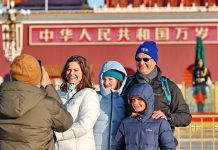URUMQI: When dawn breaks over the snow-capped Baluke Mountain, Selekbek Tokesi drives his sheep to pasture, before returning home to enjoy a cup of hot milk tea and some leisure time on his smartphone by the stove.
This is how a modern-day Kazak herder in Xinjiang Uygur autonomous region typically starts his day.
Today, life on the pasture land has changed a lot. Motor vehicles, satellite televisions and smartphones have become daily essentials. Kerosene lamps and candles have been replaced by solar-powered devices.
For many nomadic families in the northwestern corner of China, the country’s modernization drive has brought continuous benefits to their daily lives.
Kazak herders move between the winter pastures, spring-autumn pastures and summer pastures throughout the year, earning the title “the most frequent movers in the world”. About 130 kilometers from the county seat, the winter pasture in the Baluke Mountain is an important grazing place for some 109,500 head of livestock in Yumin county from October to March.
Thirty years ago, Selekbek’s father built the family’s first house here, using wood and stones. “It didn’t look good, but at least it sheltered us from the wind and snow,” said Selekbek.
After his father retired from herding, Selekbek took over the livestock and built the family’s second house.
Last year, the government provided a subsidy of 10,000 yuan (about $1,440) to help the family build the third house, which was made of brick and concrete. It was solid, spacious and well-lit.
Now, the first house is used as a pen for cattle and sheep, while the second one has been turned into a storehouse. The three houses have borne witness to the great changes in the living conditions of Selekbek’s family.
–The Daily Mail-China Daily news exchange item





